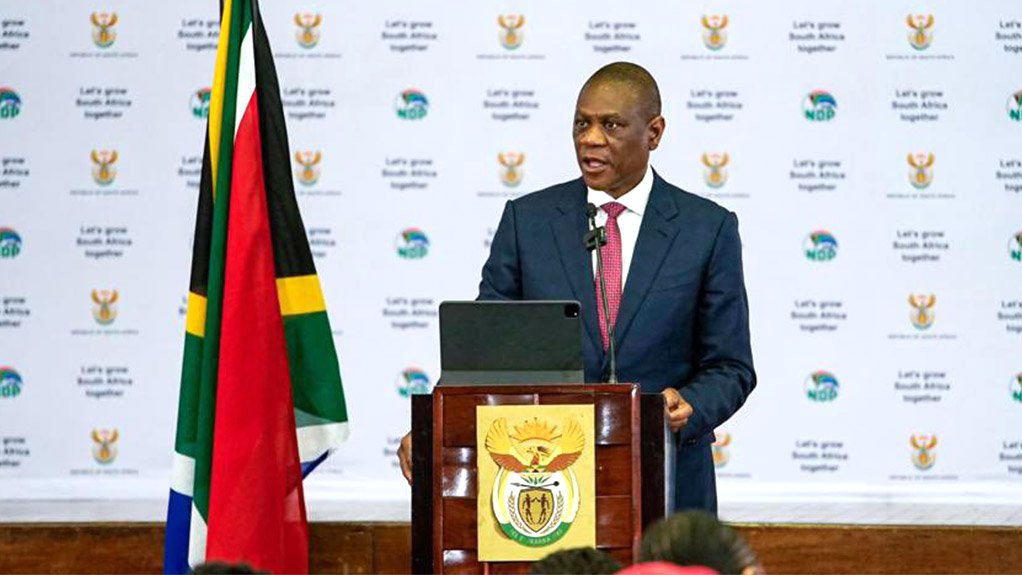Deputy President Paul Mashatile said on Friday that government is fortunate that this could be the generation in the country’s evolving democracy that co-creates and designs resilient solutions to the country’s political architecture.
Mashatile was delivering the keynote address at the two-day National Dialogue on Coalition Governments, held in Cape Town, where he pointed out that despite a promising future, the “frequent collapse" of coalitions at a local government level is deliberate, and is sometimes even unrelated to the pursuit of the public good.
The aim of the dialogue is to lay the foundation for a National Framework on Coalition Governments, which will serve as a guide for effectively managing and navigating coalition governments where they become necessary.
In attendance were political parties, Ministers, Premiers and civil society organisations. Former President Kgalema Motlanthe, former Public Protector Thuli Madonsela and retired South African politician Mac Maharaj were also among those attending the dialogue.
Mashatile said coalitions must consolidate national efforts to create a truly substantive democracy that was based on the will of the people.
This as South Africa deals with increasingly unstable coalition governments.
He saluted the work done by a number of institutions to improve and stabilise coalition governments at the local level. Mashatile said government had contributed to a commitment to a non-racial, non-sexist, democratic, and prosperous society and a coalition leadership based on the actual votes received by each party in an election.
He added that it had also committed to Batho Pele principles, working towards poverty eradication through a growing and inclusive economy, good governance and zero tolerance for corruption.
Mashatile explained that people were free to make proposals, saying government intended to synthesise proposals from as many South Africans as possible and present these in the coming months as a framework for consideration, which may or may not end up in legislation.
“This is the first time ever that the leadership of as many sectors of our country have met to deliberate on a critical issue that has caught the imagination of the nation and will undoubtedly resonate beyond our borders,” he said.
Mashatile acknowledged that in reality, the political parties’ deliberations over the next two days were several years late, as the country’s democracy had been continuously evolving, though with little collective reflection among broad sections of the country’s leadership.
He said had government paused earlier to reflect on how best to promote and maintain consensus within the country’s evolving democracy, some of the recent unstable coalitions that had played out dramatically in some metropolitan municipalities, could have been avoided.
SOCIOLOGICAL AND POLITICAL CHARACTERISTICS
Mashatile said while government must be ready and willing to learn from the coalition experiences of other countries, it must also bear in mind South Africa’s unique sociological and political characteristics.
He noted that challenges were also exacerbated by an economy that had not grown sufficiently over the years to absorb greater numbers of job seekers.
He said the sociological characteristics of the country’s society and the stagnant economy manifested in a stampede towards the political sphere, especially by the youth, who increasingly demanded greater representation in politics than in the professional space leading to a rise in variants of right-wing and left-wing populism.
He explained that the country’s sociological reality impacted the state of political parties and the country.
“I am suggesting that our social structure and its economy are central to all our endeavours. With or without coalitions in any sphere of government, but most especially because of coalitions, South Africa requires a growing economy, which creates opportunities for people beyond the political sphere. As an enduring dividend of freedom, such an economy will be a factor in social and political stability, and State- and nation-building, all of which can elude us if the economy fails,” he said.
DIALOGUE OF ACTION
Mashatile stated that the national dialogue on coalitions would not stop after its two-day sitting and said “it is just the beginning”.
“It is the launch of the dialogue that must spread across our nation as we collectively grapple with the most crucial question: what do we do going forward to serve the people even better,” he said.
National Assembly speaker Nosiviwe Mapisa-Nqakula said that the dialogue was not two days for politicking. She said the 2024 elections were critical for the country and added that the country’s unity was important.
Delivering his welcoming address, Western Cape Premier Alan Winde, like Mashatile, called on delegates to ensure that the dialogue turned into action.
“How many people in our country have not felt the change or seen the difference. We owe it to every single individual to take that responsibility, that each and every one of us has and has been given, and to use that responsibility, to make sure that this discussion is not just a dialogue, that this discussion turns into urgent action,” said Winde.
He said a game of musical chairs was played in politics.
“We find politicians thinking of office space, cars and support instead of the people who elected them to office," he said.
EMAIL THIS ARTICLE SAVE THIS ARTICLE ARTICLE ENQUIRY
To subscribe email subscriptions@creamermedia.co.za or click here
To advertise email advertising@creamermedia.co.za or click here











